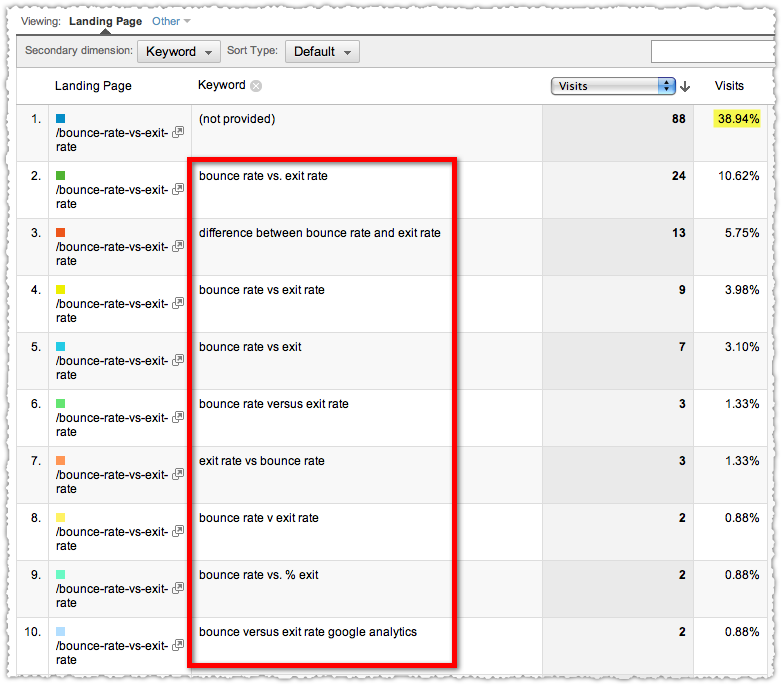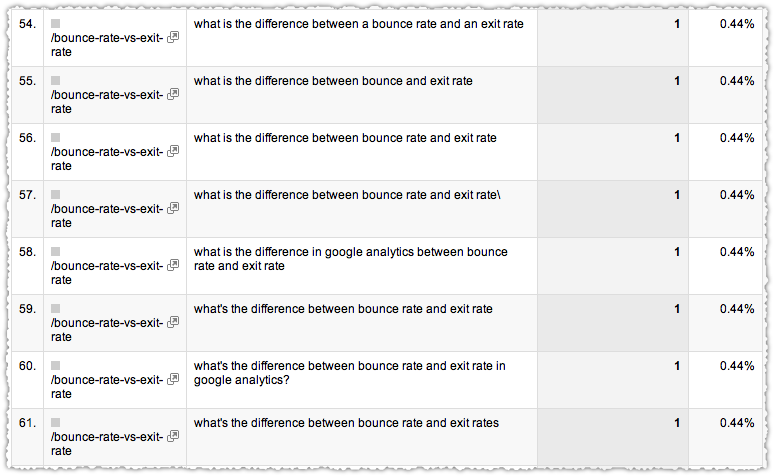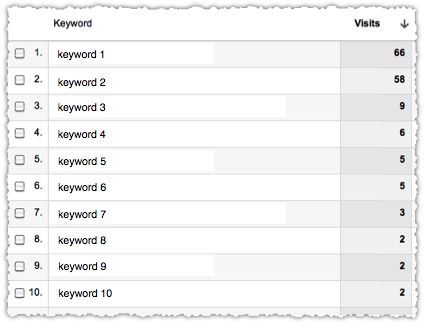Do I think Google’s policy around encrypting searches (except for paid clicks) for logged-in users is fair? No.

But whining about it seems unproductive, particularly since the impact of (not provided) isn’t catastrophic. That’s right, the sky is not falling. Here’s why.
(Not Provided) Keyword
By now I’m sure you’ve seen the Google Analytics line graph that shows the rise of (not provided) traffic.

Sure enough, 17% of all organic Google traffic on this blog is now (not provided). That’s high in comparison to what I see among my client base but makes sense given the audience of this blog.
Like many others (not provided) is also my top keyword by a wide margin. I think seeing this scares people but it makes perfect sense. What other keyword is going to show up under every URL?
Instead of staring at that big aggregate number you have to look at the impact (not provided) is having on a URL by URL basis.
Landing Page by Keywords
To look at the impact of (not provided) for a specific URL you need to view your Google organic traffic by Landing Page. Then drill down on a specific URL and use Keyword as your secondary dimension. Here’s a sample landing page by keywords report for my bounce rate vs exit rate post.

In this example, a full 39% of the traffic is (not provided). But a look at the remaining 61% makes it pretty clear what keywords bring traffic to this page. In fact, there are 68 total keywords in this time frame.

Clustering these long-tail keywords can provide you with the added insight necessary to be confident in your optimization strategy.
(Not Provided) Keyword Distribution
The distribution of keywords outside of (not provided) gives us insight into the keyword composition of (not provided). In other words, the keywords we do see tell us about the keywords we don’t.
Do we really think that the keywords that make up (not provided) are going to be that different from the ones we do see? It’s highly improbable that a query like ‘moonraker steel teeth’ is driving traffic under (not provided) in my example above.
If you want to take things a step further you can apply the distribution of the clustered keywords against the pool of (not provided) traffic. First you reduce the denominator by subtracting the (not provided) traffic from the total. In this instance that’s 208 – 88 which is 120.
Even without any clustering you can take the first keyword (bounce rate vs. exit rate) and determine that it comprises 20% of the remaining traffic (24/120). You can then apply that 20% to the (not provided) traffic (88) and conclude that approximately 18 visits to (not provided) are comprised of that specific keyword.
Is this perfectly accurate? No. Is it good enough? Yes. Keyword clustering will further reduce the variance you might see by specific keyword.
Performance of (Not Provided) Keywords
The assumption I’m making here is that the keyword behavior of those logged-in to Google doesn’t differ dramatically from those who are not logged-in. I’m not saying there might not be some difference but I don’t see the difference being large enough to be material.
If you have an established URL with a history of getting a steady stream of traffic you can go back and compare the performance before and after (not provided) was introduced. I’ve done this a number of times (across client installations) and continue to find little to no difference when using the distribution method above.
Even without this analysis it comes down to whether you believe that query intent changes based on whether a person is logged-in or not? Given that many users probably don’t even know they’re logged-in, I’ll take no for 800 Alex.
What’s even more interesting is that this is information we didn’t have previously. If by chance all of your conversions only happen from those logged-in, how would you have made that determination prior to (not provided) being introduced? Yeah … you couldn’t.
While Google has made the keyword private they’ve actually broadcast usage information.
(Not Provided) Solutions

Don’t get me wrong. I’m not happy about the missing data, nor the double standard between paid and organic clicks. Google has a decent privacy model through their Ads Preferences Manager. They could adopt the same process here and allow users to opt-out instead of the blanket opt-in currently in place.
Barring that, I’d like to know how many keywords are included in the (not provided) traffic in a given time period. Even better would be a drill-down feature with traffic against a set of anonymized keywords.

However, I’m not counting on these things coming to fruition so it’s my job to figure out how to do keyword research and optimization given the new normal. As I’ve shown, you can continue to use Google Analytics, particularly if you cluster keywords appropriately.
Of course you should be using other tools to determine user syntax, identify keyword modifiers and define query intent. When keyword performance is truly in doubt you can even resort to running a quick AdWords campaign. While this might irk you and elicit tin foil hat theories you should probably be doing a bit of this anyway.
TL;DR
Google’s (not provided) policy might not be fair but is far from the end of the world. Whining about (not provided) isn’t going to change anything. Figuring out how to overcome this obstacle is your job and how you’ll distance yourself from the competition.
The Next Post: URL Titles
The Previous Post: Mozilla Search Showdown

8 trackbacks/pingbacks
Comments About Not Provided Keyword Not A Problem
// 8 comments so far.
Adam Audette // November 21st 2011
Nice approach here, AJ. I just shared this with our team. Thanks for putting it out there!
AJ Kohn // November 21st 2011
Thanks Adam. I’m not sure it’ll work for every installation but it’s worked fairly well for me so far. Would love to hear what your team finds.
By the way, I liked your ideas (in Avinash’s comments) on running PPC side by side SEO to get more insight. Might not be popular but I think it’s smart.
Moe Rubenzahl // November 22nd 2011
Good post. Sensible heads prevail.
Steffen Daleng // December 16th 2011
Well written. I couldn’t agree more.
Still having data is better than nothing, and if you really feel that you can’t comprehend the missing data, it would be a sign that you don’t really have a strategy for your rankings for the given landing pages, so back to basics and start with that, and your intuition combined with the existing data, will reveal the true nature.
Dali Burgado // December 19th 2011
Hey AJ,
It is nice to read an article that provides some solutions to getting around the (not provided) keywords issue. I admittedly was upset about it, but then got over it. So simple a recommendation – taking a closer look at your Google organic traffic by Landing Page – and it makes sense. Instead of being mad about it, you can find ways to work around it. Thank you for the insights, AJ.
And you cracked me up with the “I’ll take no for 800 Alex.” 🙂
Dali
AJ Kohn // December 23rd 2011
Thank you Dali.
As I mention, I’m not thrilled about the (not provided) double standard but I’d rather find solutions rather than fume about it the ‘problem’. There’s enough data there (and elsewhere) to allow us to do our jobs. Thanks again for your comments both here and on Google+ Dali.
Michael Allen // February 27th 2012
We’re noticing over the past 3 months that more and more people are coming in with encrypted keywords in their search. We see this in our GA. We also use an app to monitor real time visitors and more and more people are coming in with their search words encrypted. I assume that since this is only for logged in users (Google), more and more people are signing up for Google.
I’m very disappointed in this for now our keyword monitoring is being degraded.
Netokracja // June 12th 2014
Great article, i translate something from that post into my website (polish blog).
And again 🙂 – This is really nice work AJ
Sorry, comments for this entry are closed at this time.
You can follow any responses to this entry via its RSS comments feed.